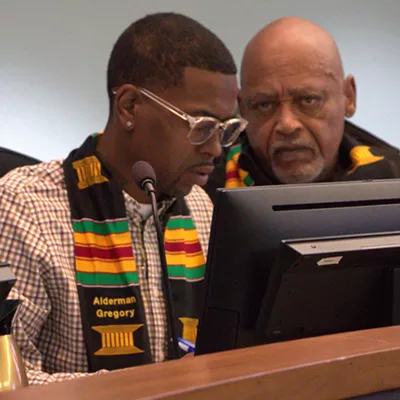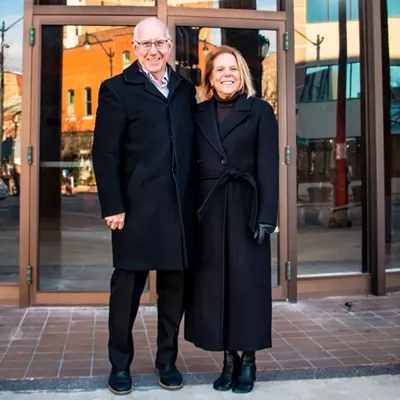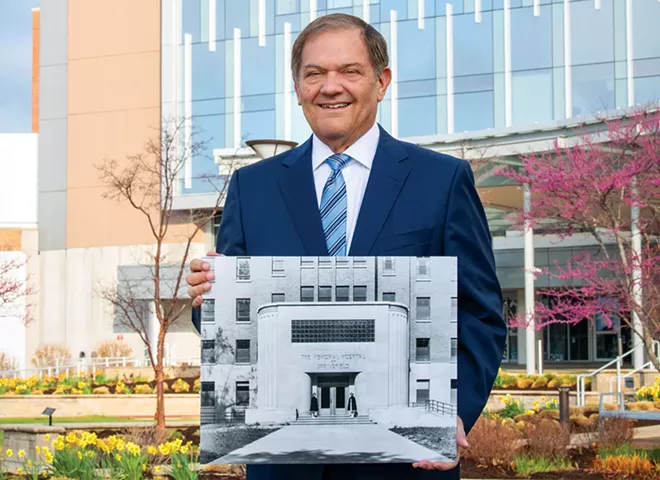
Edgar Curtis was 17 and a junior at Lanphier High School when an aunt he was particularly close to died from cancer at 47 after a 100-day stay at Springfield Memorial Hospital.
During the many visits he made during her decline, Curtis said he noticed "the kind heart and compassionate care" that his aunt received from the hospital's nurses. The experience inspired him to pursue a career in nursing, even though less than 3% of the nation's nurses were male in 1970.
The Springfield native – the first person in his working-class family to go to college – said his perspective as a nurse helped guide him during a 50-year career at Memorial Health to keep the focus on patients and community.
Curtis, 72, who capped off that career with a 17-year stint as the five-hospital health system's president and chief executive officer, retired March 31. His successor is Mandy Eaton, former executive vice president and chief operating officer of Cone Health, a nonprofit that includes five hospitals and numerous outpatient locations serving a five-county area in North Carolina. Eaton, 47, was born and raised in upstate New York.
Though leaders inside and outside of the health care industry locally and statewide said Springfield benefited from Curtis' work ethic, competency and kindness, he was quick to credit others for any good things that happened during his tenure at the helm of the city's largest private employer.
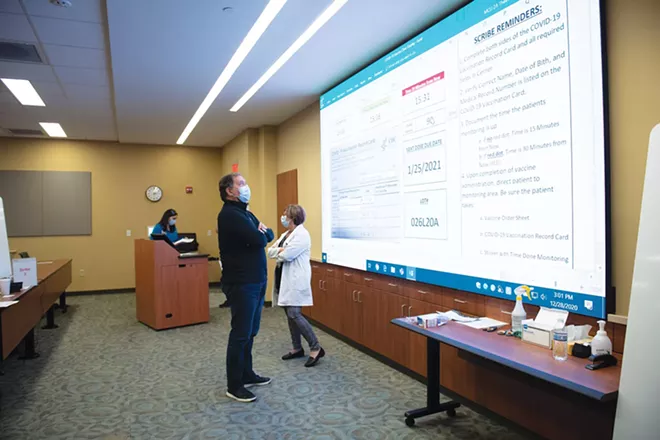
"The people of Memorial are what has kept me here for 50 years," Curtis told Illinois Times, "and what I'm most proud of is what we've achieved together. I think the successes we've experienced as an organization while I was here are not my personal achievements, but the work of the whole organization," he said.
Curtis' tenure at Memorial, a $1.6 billion-a-year organization with the equivalent of 7,200 employees, more than 5,000 of them in Sangamon County, was characterized by growth and ongoing partnerships with other players in the local health care marketplace.
He dealt with workforce and financial challenges at Memorial before, during and after the COVID-19 pandemic.
And as chair of the board of the Illinois Health and Hospital Association in 2017, he was a leader statewide and nationally in the ultimately successful effort to beat back efforts by Republican members of Congress and President Donald Trump in Trump's first term to "repeal and replace" the Affordable Care Act.
Curtis led Memorial Health as it navigated financial constraints during a record two-year state budget impasse from 2015 to 2017. And he marshaled Memorial's resources and worked with HSHS St. John's Hospital, Southern Illinois University School of Medicine, Springfield Clinic and other providers as they dealt with a once-in-a-generation pandemic.
Staffing, financial challenges
COVID-19 claimed the lives of more than 1,000 patients at Springfield Memorial just in the pandemic's first year.
"I saw the best of people during the pandemic," Curtis said, noting that COVID-19 first hit Illinois almost exactly five years ago. "There was a lot of trepidation about the unknown."
At a time when a vaccine wasn't available and amid all the chaos and fears for their own health and the health of their families, "the people of Memorial stepped up and never said 'no,'" he said.
As it did nationwide, the pandemic took a financial toll on Memorial Health. It led to staff burnout and reduced interest in jobs at hospitals and other health care centers needing skilled practitioners around the clock, Curtis said, and it made the nursing shortage worse. Memorial had to hire even more temporary, or "traveling," nurses and other staff, and pay permanent employees more, to help fill the gap.
Memorial initially saw a 40% increase in labor costs – amounting to $250 million annually – for Memorial's hospitals and other sites in Springfield, Decatur, Jacksonville, Taylorville and Lincoln. And reimbursements from Medicaid and Medicare, which account for about two-thirds of the system's revenues, haven't kept up with the cost of labor, Curtis said.
Memorial Health experienced a record loss of $107 million on operations, and a total of $227 million when including investment losses related to the downturn in the stock market, in the fiscal year that ended in September 2022. That situation paved the way for about 300 layoffs in September 2023. The cuts were estimated to save the system an estimated $40 million a year.
The layoffs, which eliminated one in every five leadership positions at the 128-year-old organization, followed layoffs of about 140 workers in 2020, the first year of the pandemic.
"My biggest regret as a leader is that it would have to come to that," Curtis said.
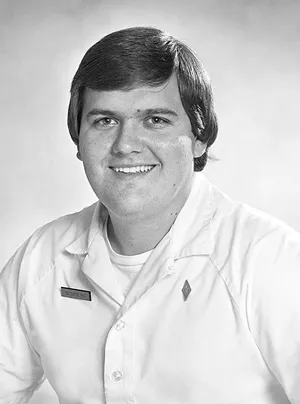
The staff reductions, and internal efficiency efforts that have saved millions of dollars, have helped Memorial return to the black. The system posted an operating loss of 4.8% in fiscal 2023, amounting to $74 million, but saw a 1.8% positive margin of $29.5 million in the fiscal year that ended in September 2024. The system's flagship hospital, 500-bed Springfield Memorial, made $30.4 million, or 3.7% in the black, based on $831 million in total revenues that year.
"It's still going to be challenging because we still don't have enough workforce to meet all the demands and needs," he said, "and it still requires us to supplement with temporary staff, which are more expensive than permanent staff."
Costs for temporary staff have eased but still are higher than before the pandemic, Curtis said.
"The new normal is, financially, we're stable. We have been for the last year and a half," he said.
Academic partnerships with Memorial to expand local nursing education programs are beginning to yield dividends, Curtis said. Those partnerships include institutions such as Lincoln Land Community College, Mennonite College of Nursing at Illinois State University, Richland Community College, Illinois College, University of Illinois Springfield and University of Illinois Chicago College of Nursing.
Not all of the graduating nurses are joining Memorial, he said, "but them coming into the community is helping everyone. That is a real blessing."
He noted that both Springfield Memorial and Jacksonville Memorial have achieved and maintained "magnet status" from the American Nurses Credentialing Center, the prestigious designation that recognizes a work culture that supports nurses and the nursing profession.
Curtis spearheaded a tenfold increase in financial support for SIU School of Medicine from Memorial, from about $7 million in 2007 to about $70 million per year currently.
Curtis said SIU is a "national treasure" and has had a profound effect on Springfield, contributing to the increase of doctors practicing in the community from 100 in 1970 to more than 1,000 today. SIU was essential in making Springfield a downstate medical hub for specialty care, and he said SIU has created a pipeline to supply new doctors for the region.
A CEO with bedside manner
Concerns about a global pandemic and aspirations for a career in the upper echelons of health care management weren't in Curtis' mind when he graduated with a bachelor's degree in nursing at SIU's Edwardsville campus and started his first job in 1975, working as a Springfield Memorial registered nurse on a medical/surgical floor.
He worked as a Memorial bedside nurse for 15 years before working in a series of management jobs. Curtis earned a master of business administration degree from the University of Illinois at Urbana-Champaign and was named senior vice president and chief operating officer of Memorial Health in 1993, the No. 2 position under Robert Clarke.
Clarke was president and CEO for 24 years before retiring in late 2007, and Curtis became the top leader in 2008. Curtis is the highest-paid leader and received $1.4 million in base pay, bonuses and financial incentives in fiscal 2023, according to the most recent data available through the Form 990 report that Memorial filed with the IRS.
Curtis, who said, "I felt like I was called to Memorial to serve others," never had to apply for any of the jobs he was promoted to at the organization. He was asked to serve and said, "I enjoyed every role I have had at Memorial."
Mike Aiello, president of Memorial Health's board of directors, said, "CEOs with bedside nursing experience are very rare, but it's especially meaningful to have a leader who has spent his entire 50-year career with the same organization in his hometown. His dedication and commitment to the well-being of the people of central Illinois has had a tremendous impact on so many lives."
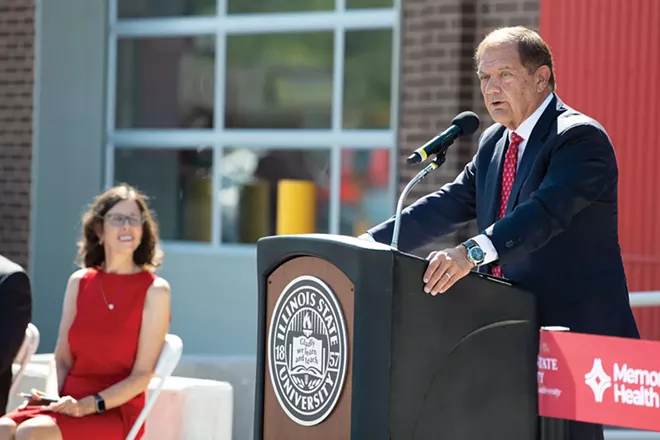
Dr. Jerry Kruse, SIU medical school's dean and provost, has known Curtis for 30 years. Kruse called Curtis a visionary and a "master at engaging other organizations" to benefit community health.
Curtis remembers people's names and family circumstances and genuinely cares about people, Kruse said.
"He knows everybody and doesn't forget anybody," Kruse said. "He and the team at Memorial are dedicated to building great places to work for the physicians and other health care professionals. ... He has just had an astounding impact on building better health care education."
Jen Boyer, CEO of Springfield Clinic and a registered nurse, said, "Ed Curtis has been a strong leader and advocate for exceptional health care in our community and across Illinois."
Boyer said she "had the privilege of working under Ed's leadership" in Springfield Memorial's emergency department, and the experience "deeply shaped my own path in health care. His role in growing and supporting the next generation of physicians has helped Springfield become – and remain – one of the best places in the state to receive care. His guidance, compassion for both patients and staff, and commitment to health care education are examples of what leadership in health care should be."
Kruse said Curtis has been a mentor for many young people in health care. One of those beneficiaries was A.J. Wilhelmi, a lawyer and former Democratic state senator from the Joliet area who is president and CEO of the Illinois Health and Hospital Association, which advocates on behalf of hospitals statewide.
Wilhelmi said Curtis, who served on the all-volunteer IHA board for 10 years, "has a full appreciation and understanding of the intersection of policy and politics, and he has just been a tremendous leader for IHA."
Wilhemi, 56, said Curtis "epitomizes servant leadership, and he has mentored hundreds of young people as they pursue their career path in health care over the years. He has been a mentor for me and a dear friend."
Wilhelmi said Curtis has a "genuine desire to help people grow and be the best version of themselves. He is a tremendous leader, but an even better person. ... He has had a profound impact on the Illinois hospital community.
"There's no question that his training as a nurse, and really his genuine compassion for people, has made Memorial in Springfield a top-notch tertiary center that provides high-quality care to its patients," Wilhelmi said.
Chatham resident Jay Sexton, a former computer systems manager at Springfield Memorial, was among the workers laid off in 2023 but said there were no hard feelings about his layoff.
"It's easy to blame people for decisions you didn't have to make," Sexton said.
On the contrary, Sexton, 51, who worked for Memorial 23 years, including several years as an emergency room nurse, said he considered Curtis a mentor.
"I think Ed's a fantastic person and leader," said Sexton, who is now a full-time business instructor at Illinois College in Jacksonville. "I have nothing but positive things to say. ... He was very even-keeled in his approach. He treated me well and guided me well. I look up to him still."
Mayor Misty Buscher and the Springfield City Council issued a proclamation that made March 18, 2025, "Edgar J. Curtis Day" in the city. The mayor said Curtis' career is a "story of success from a local person who stayed in the community to make that success happen.
"He keeps a level head, regardless of how stressful the situation is, and he also understands that leadership isn't always good news," Buscher said. "You have to deliver bad news, too, but he delivers that bad news with caring and compassion."
Curtis has served on the boards of the Springfield Urban League, United Way of Central Illinois and Central Illinois Foodbank. He currently chairs the Springfield Sangamon Growth Alliance, which promotes economic development in the Mid-Illinois Medical District and other parts of the community.
"Ed understands the importance of having a robust regional economy," said Ryan McCrady, president and CEO of the Growth Alliance. "During his service as board chair to SSGA, our community achieved billions of dollars of investment and significant job growth."
Curtis lives with his wife, Sharon, in Springfield, and they don't plan to leave. The couple have two adult children, and their five grandchildren all live in the Springfield area. Curtis' surviving parent, his mother, is 98 and still lives in Springfield.
"My final message to Memorial is one of great gratitude," he said. "Whether it's the good times or the challenging times like the pandemic, no matter what the circumstances, it's the people of Memorial who make this organization what it is."




